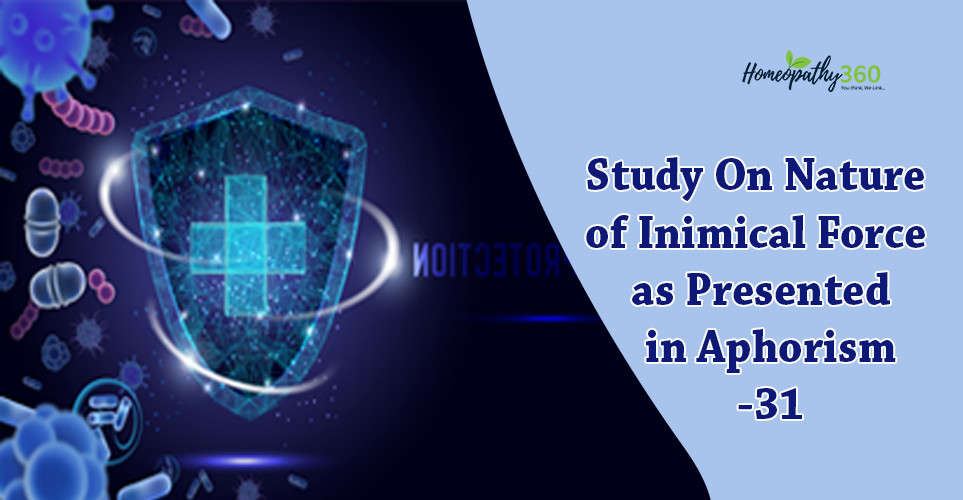
Properties of an Inimical Force (Susceptibility): –Aphorism 31 of Organon of Medicine by Dr. Samuel Hahnemann is one of the most intriguing and debated aphorisms among homeopathy enthusiasts. In this aphorism, Hahnemann discusses the concept of inimical forces, which are external factors that can interfere with the healing process. He identified the presence of these forces as a significant obstacle to cure, and it became a fundamental tenet of homeopathic philosophy. However, the term ‘inimical forces’ has been controversial and confusing for many practitioners. we will delve deep into Aphorism 31 and attempt to decode the meaning and nature of inimical forces. Aphorism 31 in the Organon of Medicine is a thought-provoking piece of wisdom that delves into the intricate nature of inimical forces in the realm of medicine. Written by Samuel Hahnemann, the founder of homeopathy, this aphorism encapsulates the essence of understanding the dynamics between the human body and the forces that act upon it. At its core, Aphorism 31 emphasizes the significance of recognizing and comprehending the inimical forces that hinder the process of healing. These forces can manifest in various forms, including physical, emotional, and environmental factors that disrupt the balance and harmony within the body. By understanding the nature of these forces, practitioners of medicine can better tailor their treatments and remedies to address the underlying causes of illness. Hahnemann’s exploration of inimical forces invites us to contemplate the intricate interplay between external influences and the internal workings of the human body. It urges us to delve beyond the superficial symptoms and delve into the deeper roots of disease, seeking to restore the body’s inherent ability to heal itself. Furthermore, Aphorism 31 serves as a reminder that the path to true healing lies in addressing the underlying causes rather than merely suppressing the symptoms. It calls for a holistic approach that takes into account the individual’s unique constitution, susceptibility, and the specific inimical forces that may be at play. medicine with a greater sense of purpose and efficacy, ultimately leading to enhanced patient care and holistic healing. In conclusion, Aphorism 31 in the Organon of Medicine serves as a profound introduction to the exploration of inimical forces. It invites us to delve deeper into the understanding of the complex dynamics between the human body and the forces that act upon it. By embracing this knowledge, practitioners can navigate the realm of In the realm of homeopathy, the concept of inimical forces holds significant importance. Aphorism 31 of the Organon of Medicine delves into this intriguing phenomenon, inviting us to explore the nature of these forces and their impact on the human body. Inimical forces, in the context of homeopathy, refer to external influences that can disrupt the delicate balance of the body’s vital force. These forces can manifest in various forms, such as environmental factors, lifestyle choices, emotional stressors, or even certain medications. Hahnemann, the founder of homeopathy, believed that the vital force, responsible for maintaining health, could be weakened or disturbed by these inimical forces. This disturbance can then lead to the onset of various diseases or ailments. To fully comprehend the concept of inimical forces, it is essential to understand the principles of homeopathy. Homeopathic remedies are based on the principle of “like cures like.” According to this principle, a substance that can cause symptoms in a healthy individual can also be used to treat similar symptoms in a diseased person. In the context of inimical forces, Hahnemann suggested that the treatment of diseases caused by such forces required the removal or avoidance of the offending agents. This approach emphasizes the importance of identifying and eliminating the external factors that are acting as obstacles to the body’s natural healing process. Furthermore, Hahnemann emphasized the need for individualized treatment in homeopathy. Each person is unique, and their susceptibility to inimical forces may vary. Thus, a homeopath carefully analyzes the patient’s symptoms, medical history, and environment to identify the specific inimical forces that are affecting their health. By understanding the concept of inimical forces in homeopathy, we gain insights into the intricate relationship between external influences and our overall well-being. It reminds us of the importance of creating a harmonious environment that nurtures our vital force and allows for optimal health and healing.
Examples of inimical forces in health and disease
In the intricate world of homeopathy, the concept of inimical forces plays a significant role in understanding the nature of health and disease. These forces, as described in Aphorism 31 of the Organon of Medicine, are detrimental to the well-being of an individual and have the potential to disrupt the delicate balance of the vital force. To grasp a better understanding of these inimical forces, let’s explore some examples that can shed light on their presence in both health and disease. One common example is exposure to extreme temperatures. Sudden exposure to intense cold or heat can act as an inimical force, causing a disturbance in the equilibrium of the vital force and leading to various symptoms or ailments. Another example is the excessive use of certain medications or drugs. While these substances may initially provide relief or treat a specific condition, their prolonged or inappropriate use can become inimical to the body’s natural healing process. This can result in the manifestation of new symptoms or the aggravation of existing ones. Environmental factors can also act as inimical forces. For instance, living in a polluted or toxic environment can have a detrimental impact on an individual’s health. Exposure to pollutants, chemicals, or electromagnetic radiation can disrupt the harmonious functioning of the vital force, leading to the development of chronic illnesses or exacerbating existing ones. Furthermore, emotional and mental stressors can also be considered inimical forces. Chronic stress, anxiety, or unresolved emotional traumas can weaken the vital force and make an individual more susceptible to various diseases. These negative emotional states can act as constant stressors, depleting the body’s energy reserves and compromising its ability to maintain optimal health. By recognizing these examples of inimical forces, we gain insight into the intricacies of maintaining balance and well-being. Homeopathy aims to identify and address these forces by utilizing remedies that stimulate the vital force and restore equilibrium. Through a holistic approach, the aim is not only to treat the symptoms but also to address the underlying inimical forces and promote a state of true health and harmony.
Case Study 1:A 45-year-old patient presented with chronic migraine headaches that had been plaguing her for several years. Conventional treatments had provided minimal relief, leading her to seek homeopathic care. Upon thorough examination, it was discovered that she had been exposed to strong chemical fumes in her workplace. This exposure was identified as an inimical force, aggravating her condition. By prescribing a homeopathic remedy that specifically addressed the effects of chemical toxicity, her symptoms gradually improved, and she experienced a significant reduction in the frequency and intensity of her migraines.
Case Study 2:A 32-year-old male patient sought homeopathic treatment for chronic eczema that had been resistant to various conventional therapies. During the consultation, it was revealed that he had a long history of excessive emotional stress due to an ongoing conflict with a family member. This emotional stress was identified as an inimical force, perpetuating his skin condition. By prescribing a homeopathic remedy that targeted his emotional state and provided support for his body’s ability to cope with stress, his eczema began to subside. As he addressed the underlying emotional issues, the inimical force was gradually neutralized, leading to a significant improvement in his overall well-being. These case studies emphasize the importance of identifying and addressing inimical forces in patient treatment. Homeopathy aims to address the root cause of illness, and by understanding the impact of these forces, practitioners can tailor their remedies to restore balance and promote healing. By considering not only the physical symptoms but also the environmental, emotional, and other factors that may be acting as inimical forces, homeopaths can provide more comprehensive and effective care for their patients.





